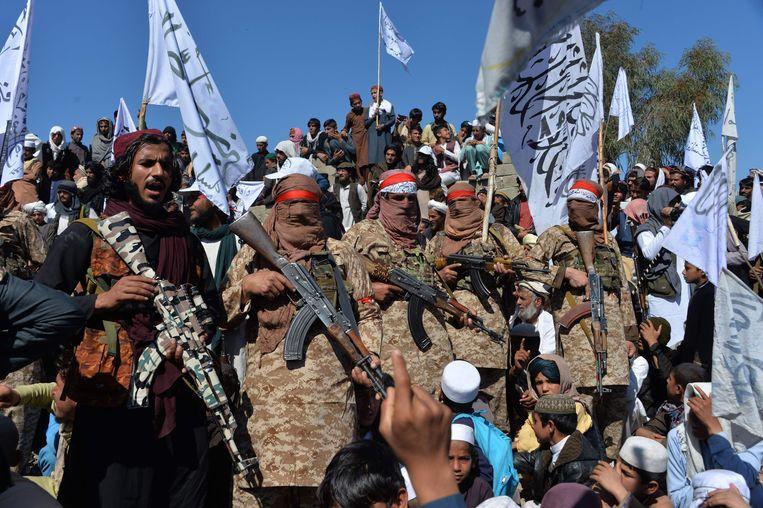As international forces complete their withdrawal from Afghanistan and the Taliban launch offensive after offensive. Looking back at this 20-year operation in an interview of French TV series, Marianne, with former French Foreign Minister Hubert Védrine, for whom “it is a tragic outcome” showing “the level of illusions of the Westerners”.
After 20 years of presence in Afghanistan, foreign troops, who were stationed there as part of a NATO mission led by the United States, are withdrawing from the country, in the midst of an offensive by the Taliban, who “could isolate the Afghan capital within 30 days and take control of it within 90 days”, according to an official from the American Department of Defense.
The operation is described as “a bitter failure on the part of the West” by Marianne, who interviewed Hubert Védrine on the subject. In addition to the geographical aspect of the country, “mountainous and difficult to access”, the former Minister of Foreign Affairs points out its fragmentation “between ethnic and tribal zones”, which means “that it is not enough to have control over Kabul to control the whole territory”.
“Afghanistan is the tomb of the right of interference. It is a tragic outcome that shows the level of illusions of the Westerners […]. In a delirious vision, the Westerners thought that decolonization had not taken place, that they were going to reign over the world, and be able to impose their conceptions of human rights in a form of evangelization. This led to a monumental fiasco,” he says.
“We have lied to these peoples”
Hubert Védrine recalls that he had approved the first operation in Afghanistan, which had the objective of crushing Al-Qaeda after the September 11 attacks in the United States.
“The problem was the second phase, which consisted of setting up in Afghanistan with thousands of men to impose modernity. I find it unworthy to have dangled our human rights values in front of these populations.” According to him, the one who knew Afghanistan already realized at the time “that it would not work”.
“This was not the case of the Westerners who generally thought they were the kings of the world. We lied to these peoples in danger, who we could not protect. Realism would have been more honest,” he says.
“The immoralism of moralism”
Hubert Védrine accepts the very idea of intervening but stresses that it is necessary to do so only “where our vital interests are at stake”.
“To say that we must eliminate a regime that is a threat to our nation is intelligible to any French or English voter. But to go and impose democracy and gender equality in other countries is completely different. If it excites the elites, normal people will tune out,” he explained.
In this context, he evokes the fate of those “who have tasted modernism” and who now find themselves abandoned. “This is what I call the immoralism of moralism,” continued the former head of French diplomacy.
When asked about the fate of the army auxiliaries who now fear for their lives with the advance of the Taliban, Hubert Védrine considers it essential to give asylum “to those who have taken risks for us”.
“We would do better to be more rigorous and demanding in order to grant refugee status to those who really deserve it. These people are among them,” he adds in conclusion.
The auxiliaries
During its intervention in Afghanistan, from 2001 to 2012, the French army employed 800 Afghans, one of whom was found shot by the Taliban at the end of June. Realizing the danger of his situation, this former cook at a French military base had applied for several visas since 2013, which were rejected each time because he did not meet the French government’s conditions for the repatriation of army auxiliaries, including the “threat level”.
Another former French army employee in Afghanistan, an interpreter, had been killed by the Taliban in October 2018 in an attack. His visa application for France had also been rejected. Nearly 270 of them have been welcomed in France.
Progress of the Taliban
As the end of the U.S. military intervention, scheduled for August 31, and the withdrawal of NATO troops approaches, the Taliban have intensified their offensives across the country.
By August 1, the Islamists had no provincial capital. Less than two weeks later, they have conquered 14 of the country’s 34 provincial capitals and boast of their entry into Kandahar, Afghanistan’s second-largest city, and Herat, a stronghold in the west.
Meanwhile, a U.S. senator said Biden’s Afghanistan policy was “reckless”. He said that if the administration does not send more troops to the field to support the Afghan military, ‘the Taliban could celebrate the 20th anniversary of 9/11 by burning down the U.S. embassy in Kabul’.
